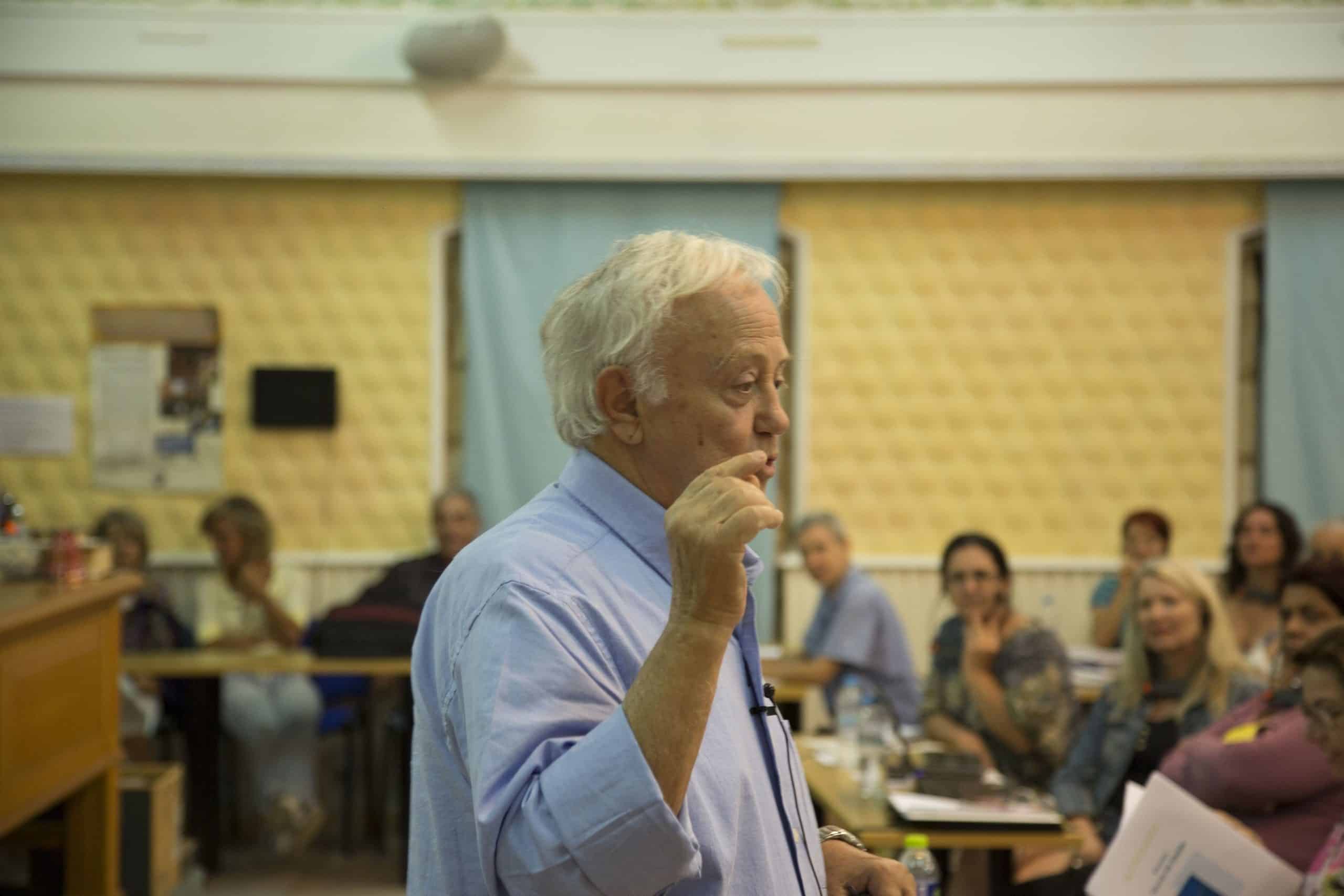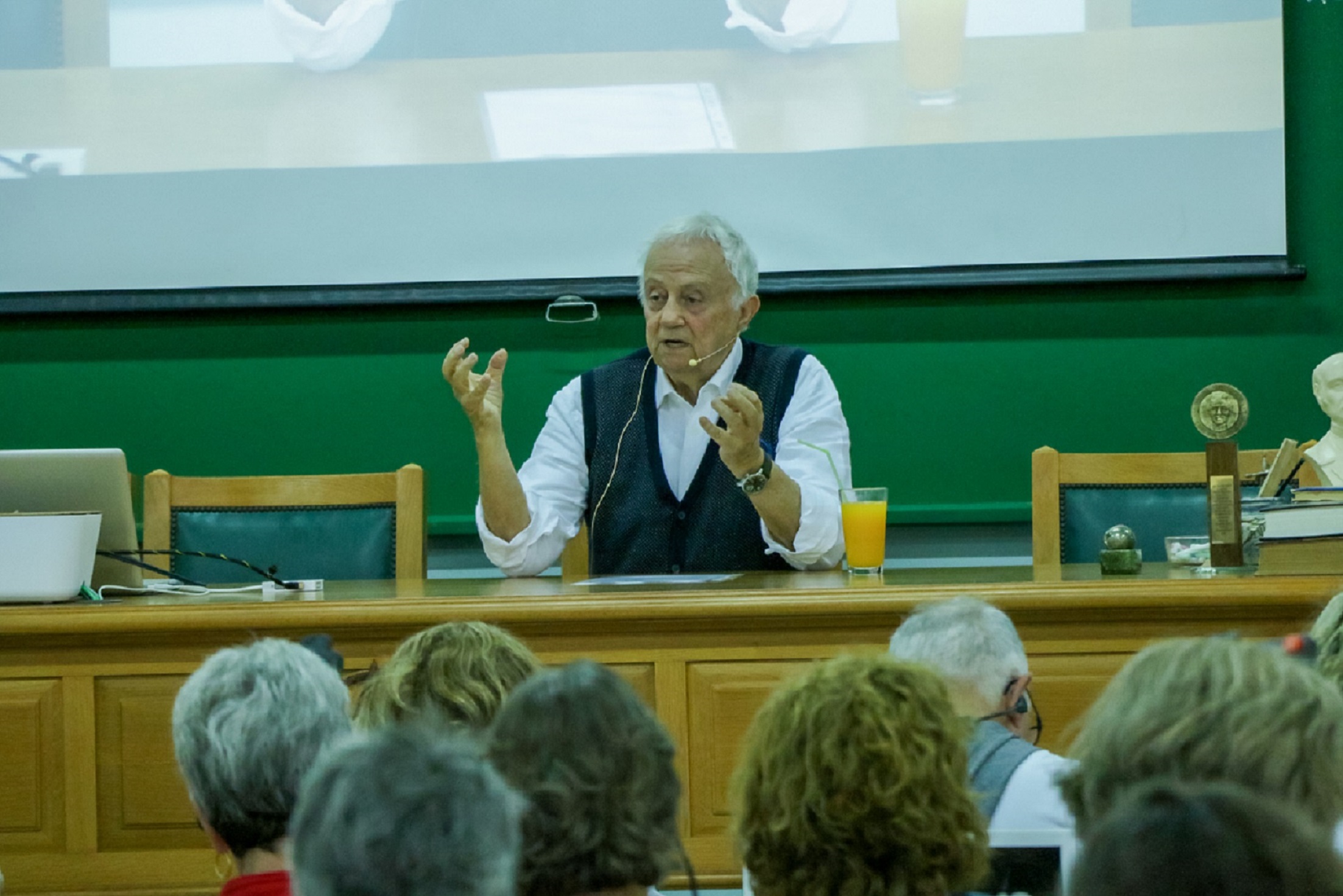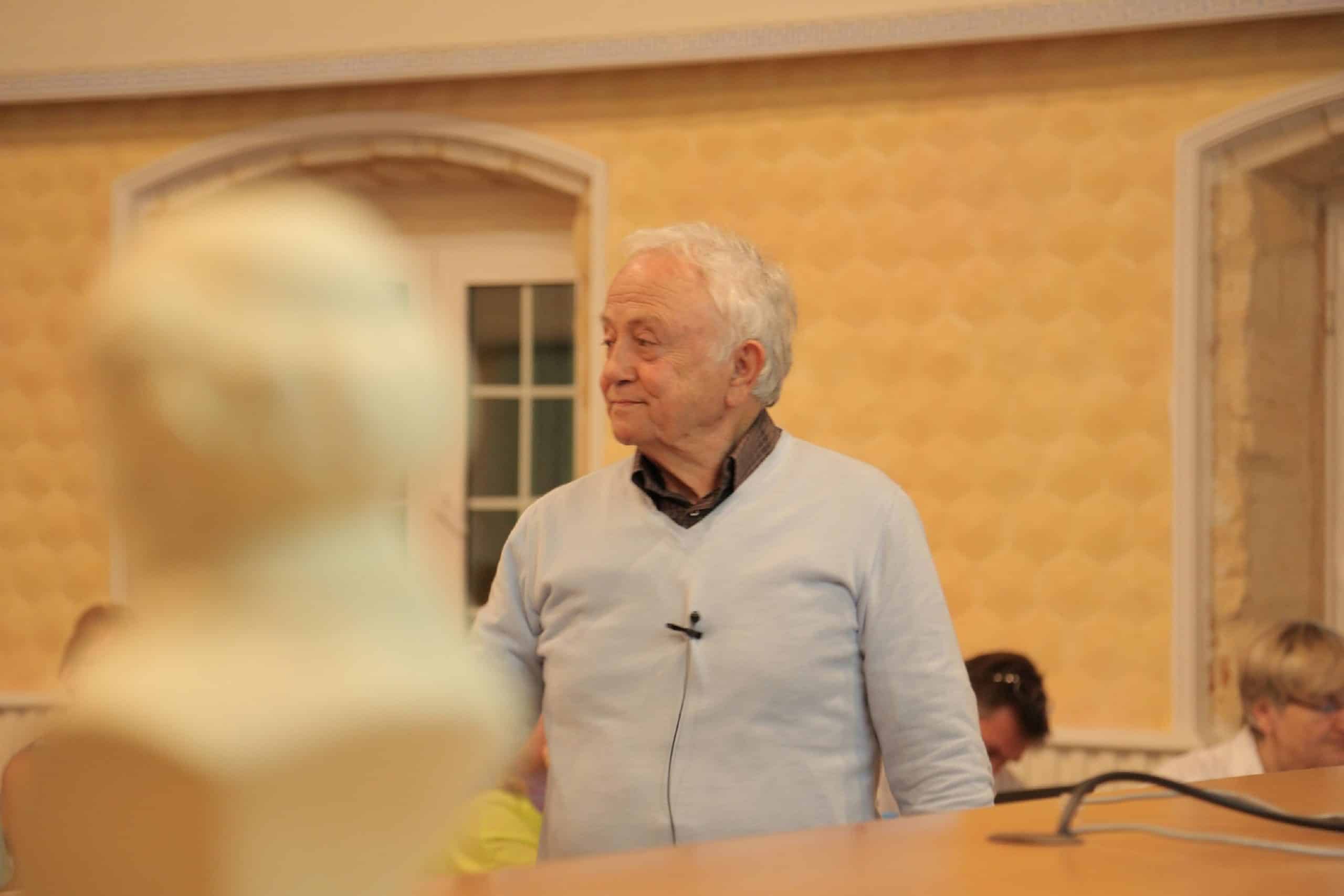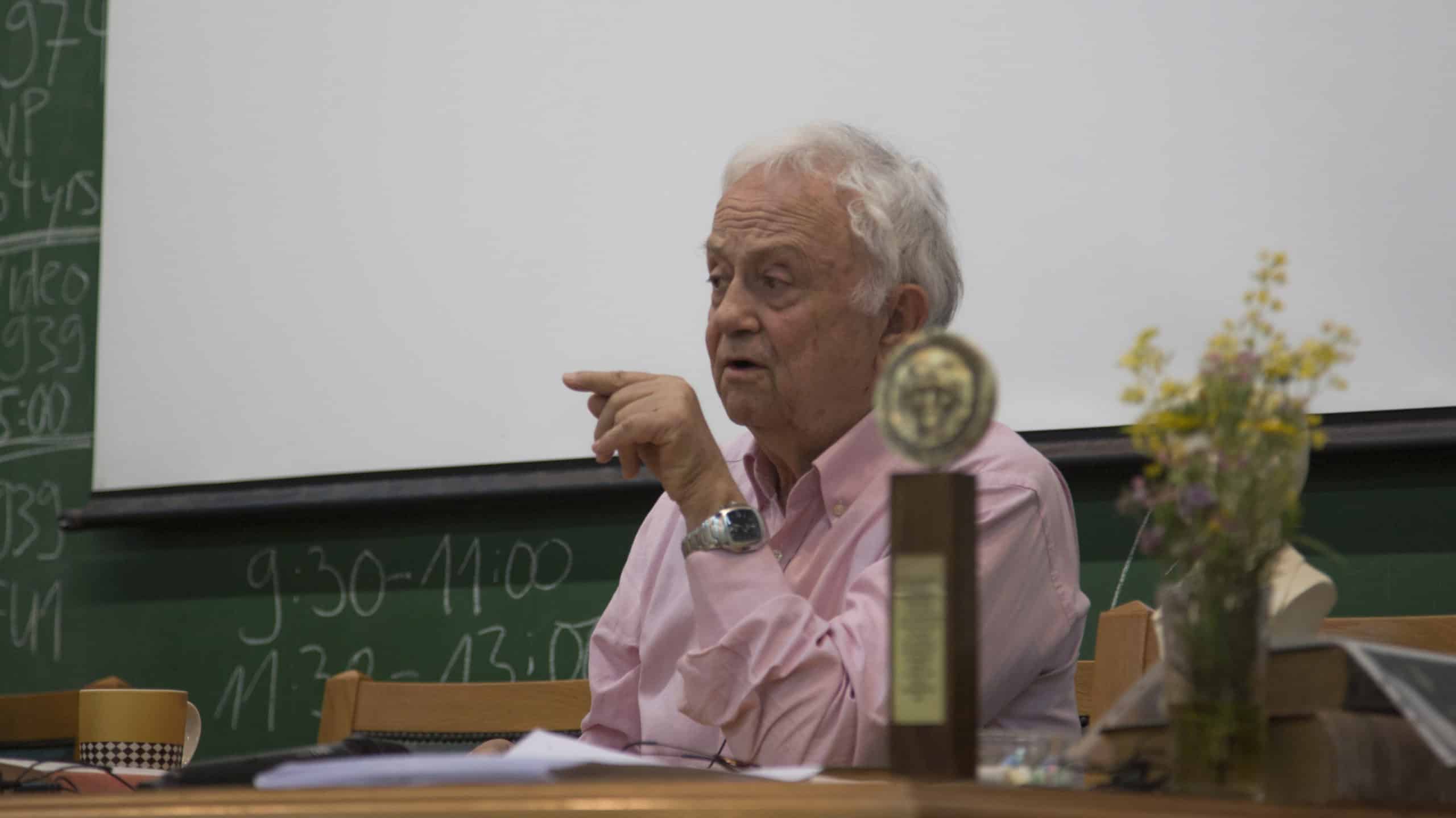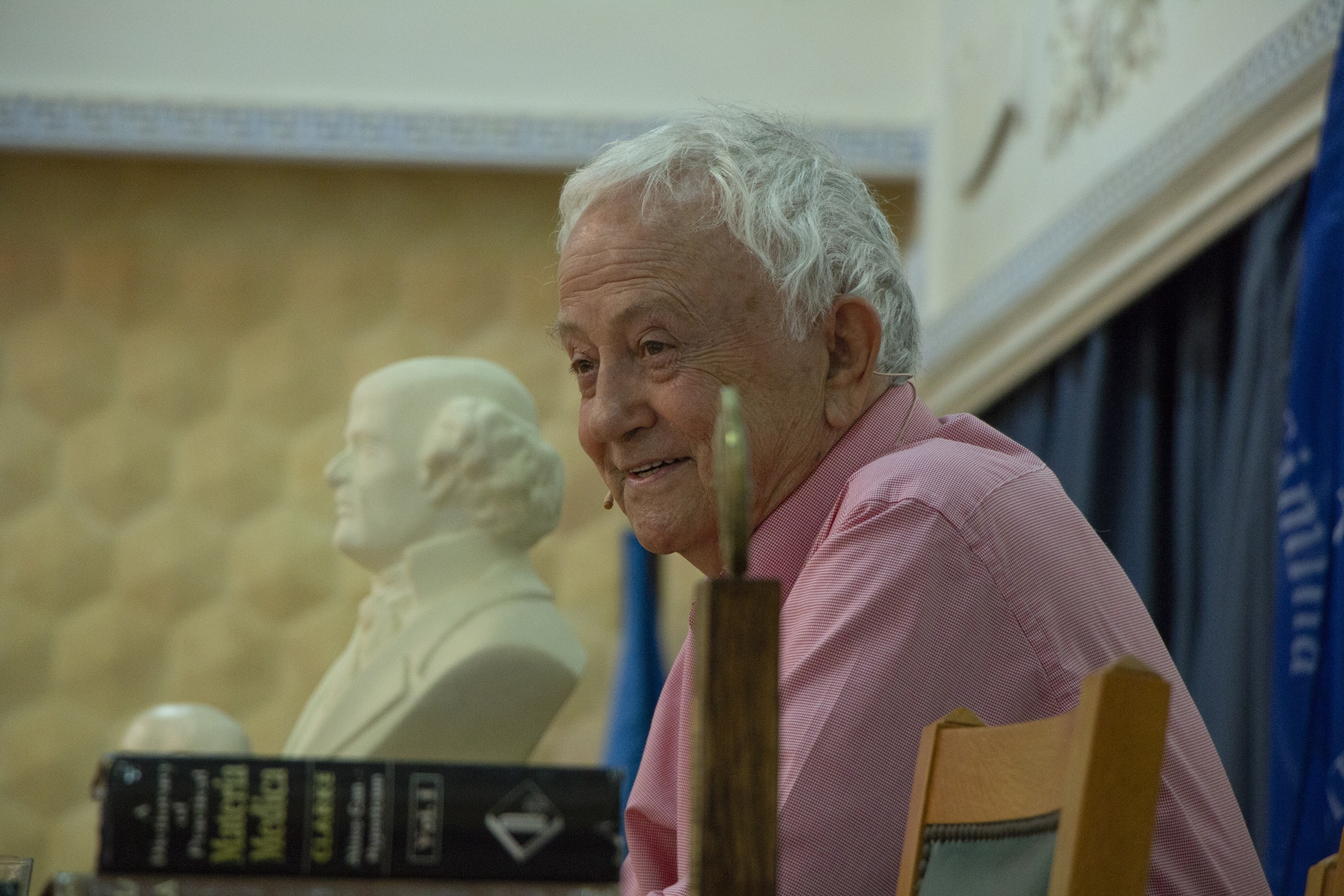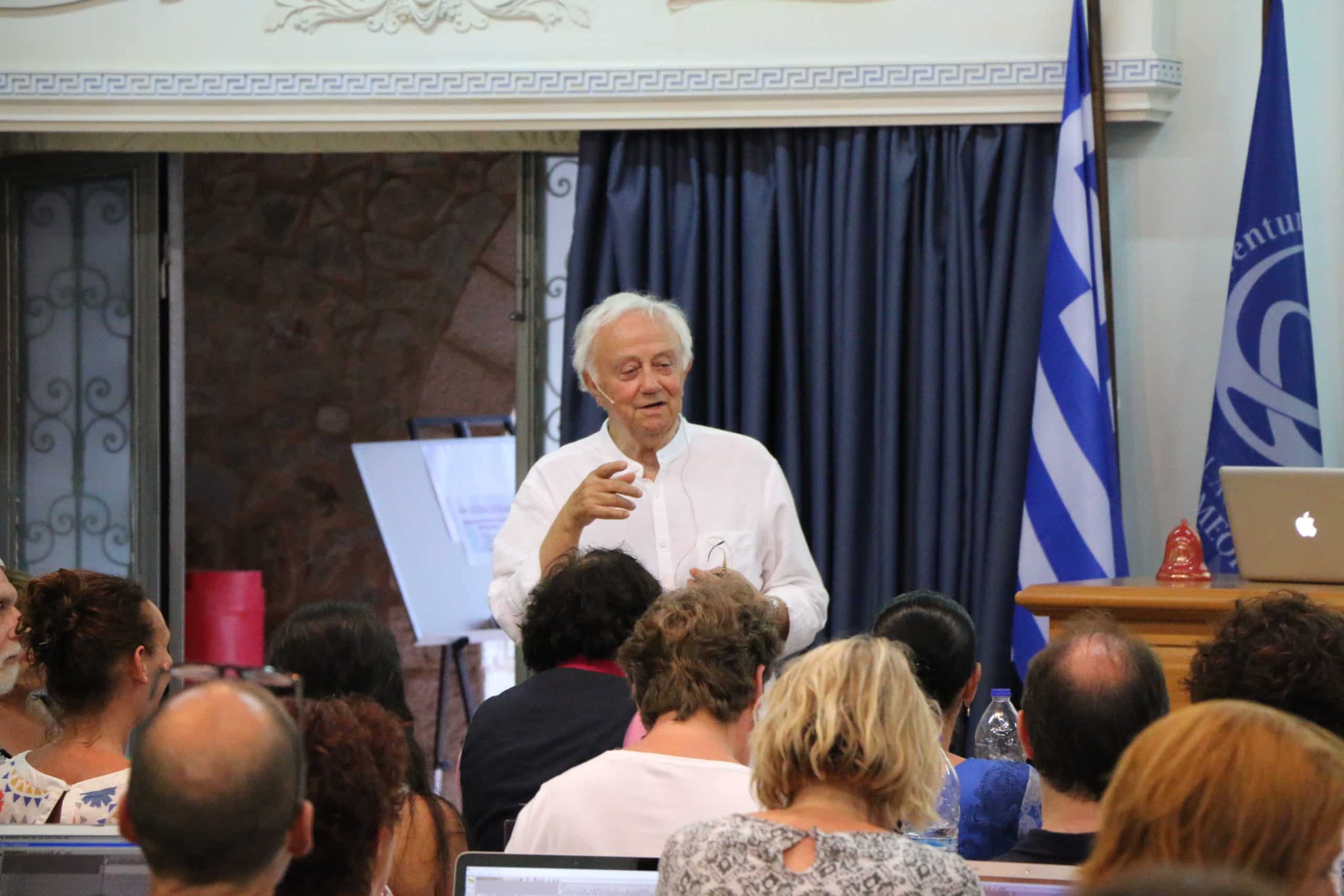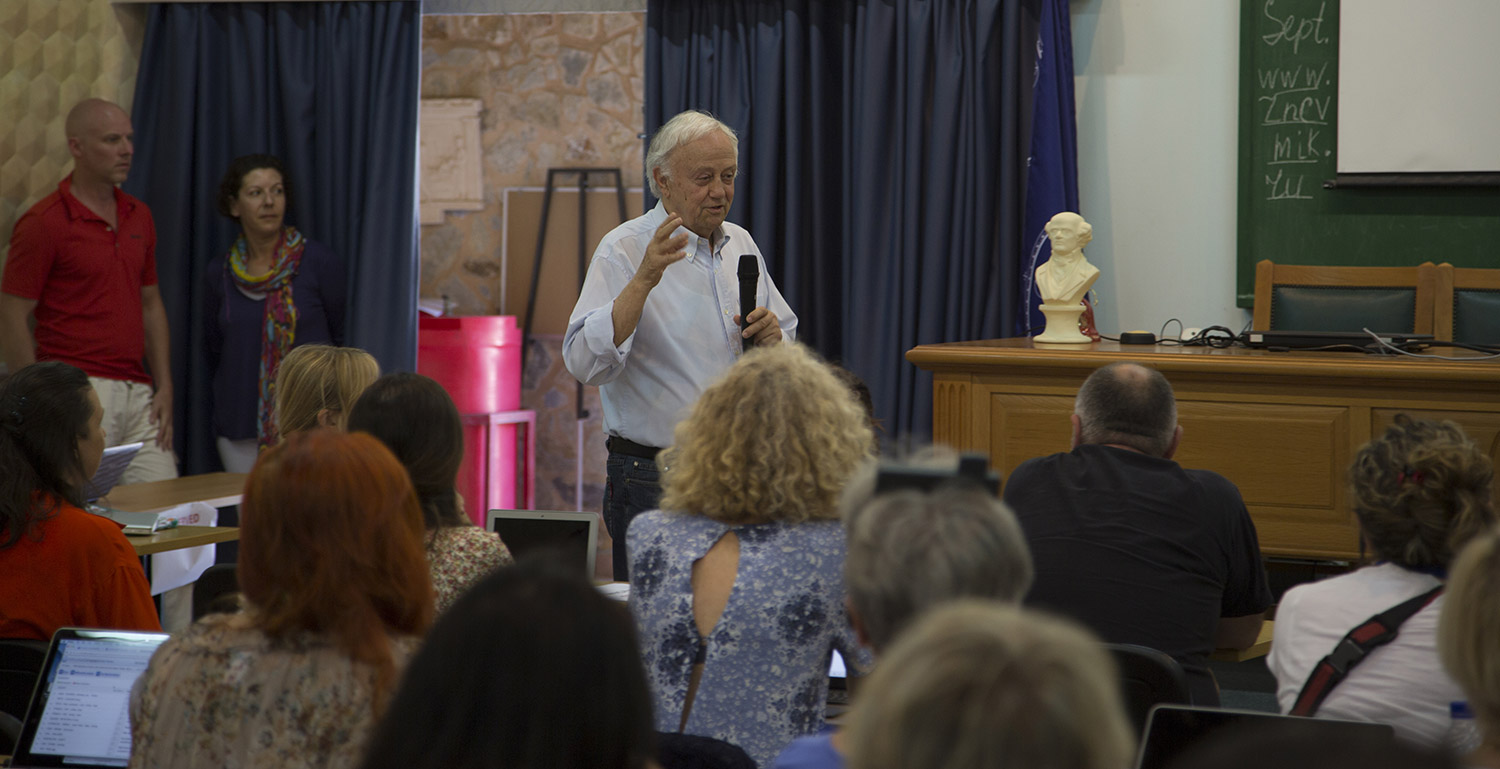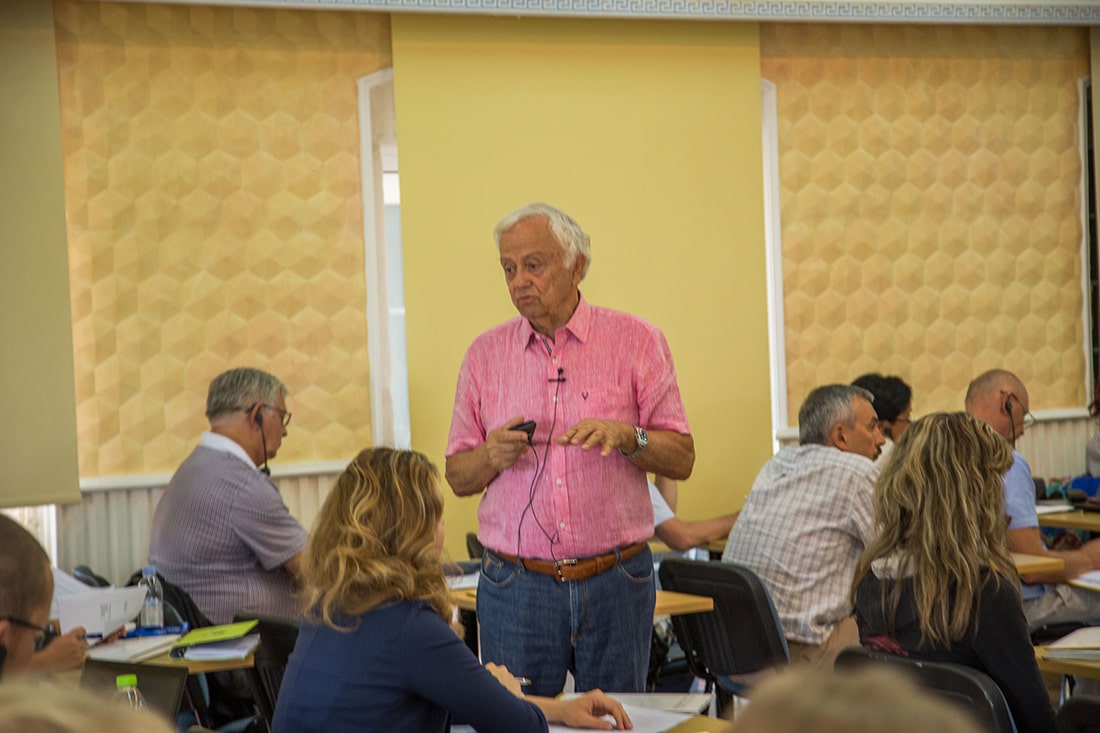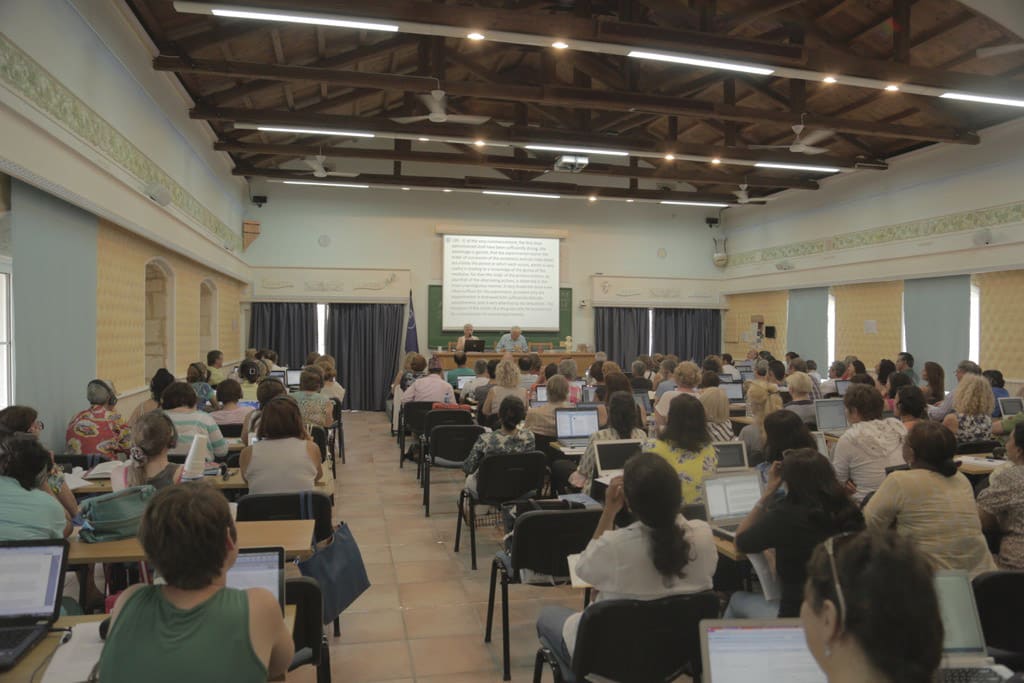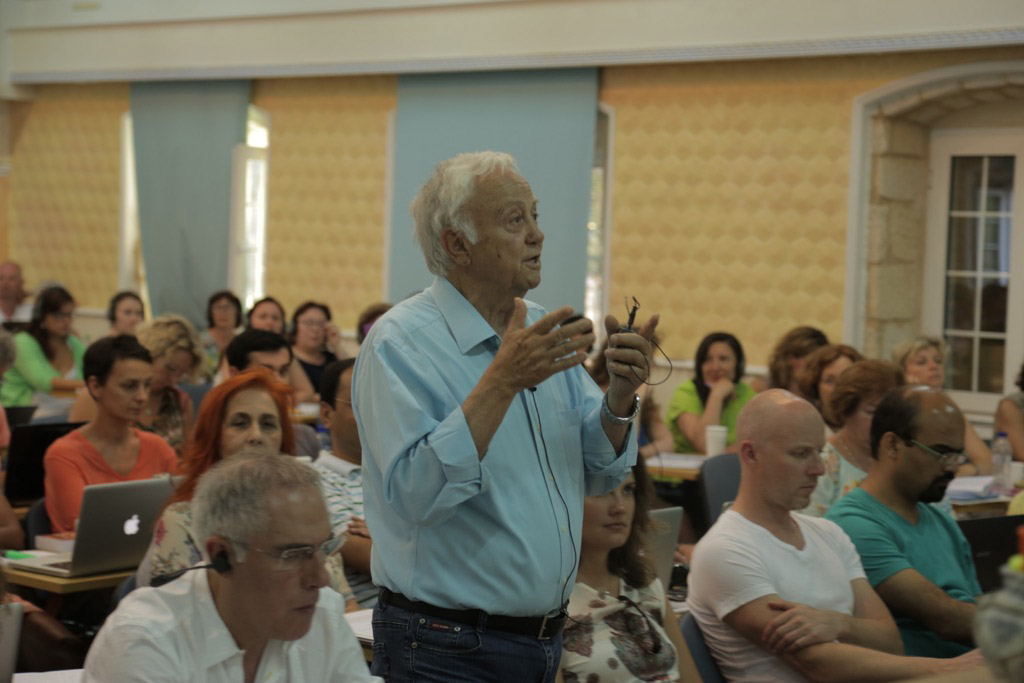Is George Vithoulkas just a fierce old fundamentalist, railing at the modern homeopathic world from the classical heights of his Academy on the Greek island of Alonissos? The sight of him striding across the sun-filled courtyard to greet us, with twinkling eyes and a welcome gift of freshly picked organic figs, immediately suggests otherwise. He may be in his seventies now, but this man is obviously totally alive, aware and full of good humour.
Interview with George Vithoulkas by Nigel Summerley and Rowena Ronson
Interview with George Vithoulkas
by Nigel Summerley and Rowena Ronson
Is George Vithoulkas just a fierce old fundamentalist, railing at the modern homeopathic world from the classical heights of his Academy on the Greek island of Alonissos? The sight of him striding across the sun-filled courtyard to greet us, with twinkling eyes and a welcome gift of freshly picked organic figs, immediately suggests otherwise. He may be in his seventies now, but this man is obviously totally alive, aware and full of good humour.
He will explain later that love and wisdom are the keynotes to the healthy future of humanity. And as he leads us on a tour of the serene teaching rooms of the International Academy of Classical Homeopathy, it is those qualities that one can feel here in abundance.
Vithoulkas is seductive. He has the power to inspire with a sentence, a gesture, a smile. Asked why on earth – when homeopathy is such a difficult art and science – do we all still do it? He says: ‘The pleasure of treating or curing a person is one of the biggest and deepest satisfactions that a human can have. There is something that a homeopath can give you that no one else can – and it concerns the quality of your life.’
He admits travel is tiring for him these days and he stays much of the time in Greece, despite requests for him to teach everywhere from Brazil to Australia. He conceded that he will speak at a major medical homeopathic conference in Berlin in May 2005 – ‘Because they kept on asking me,’ he jokes. Even here in his homeland he doesn’t say yes to every interview request, but he did want to talk to ‘The Homeopath’; he had things to say to UK homeopaths, even if at times they may not be things that all of us want to hear.
He found time to talk, in-between running his Academy, writing the remaining volumes of his phenomenal ‘Materia Medica Viva’ and finishing off collaboration with a journalist on a Vithoulkas biography. The biography was due to be published in November 2004 in Greek and he hopes that an English translation will follow soon after. ‘When it comes out, you will learn everything about me,’ he says with a mischievous smile. No doubt it will be controversial as well as entertaining and revealing.
So how did Vithoulkas’s homeopathic journey begin? He tells how he was living in South Africa more than 40 years ago when he met a guru who had been in India. ‘I remember he said: “Come, I will give you enlightenment. But I will also give you medicine.” ‘ The medicine turned out to be homeopathy. ‘I did not know what homeopathy was,’ says Vithoulkas. ‘He had some bottles – from Nelsons – there were 20 remedies inside one bottle for hay fever. Another one was for headaches. I was not impressed and I did not even pay attention.’
It was after a car accident that he decided to start reading about homeopathy. ‘I asked my friend: “What is this book you have next to your table?” It was a black book, Boericke’s Materia Medica, as big as this’ he says, picking up a Synthesis from the desk in his consulting room to illustrate the size. ‘I read it right through – it was like a revelation. I thought “My God! This man was putting together things you cannot put together.” This was in 1960. Then I went back to the pharmacy in Johannesburg and said I wanted to read more. They offered me a book on the 12 tissue salts. I said I didn’t want that. I looked at the books that they had and I took out Hahnemann’s Organon, Kent’s Lectures on Materia Medica and Hahnemann’s Materia Medica.’
It was the start of a prodigious amount of learning. By the time Vithoulkas went to study in India later in the Sixties, he declares that he found he was unable to learn anything from the local homeopaths, even though he attended schools in Bombay, Madras and Calcutta. Often the teachers were asking his opinion, he says, rather than vice versa.
He says that at that time in India there was confusion in case analysis. And there was a fashion for giving five remedies at a time. ‘One teacher in Bombay was teaching materia medica from the book,’ he says. ‘But when he was taking cases, he could not connect the symptoms to the patients.’
Vithoulkas explains his own contribution to materia medica: ‘All the remedies seemed to be the same – with a thousand symptoms in each one. My work was to take the characteristics of the remedy and make that picture unique. But some teachers don’t know these unique pictures of the remedy – and they mix personality with pathology. They are confused. In the UK especially, it is pathetic.’
Talk of mixing personality and pathology takes us into typically stormy Vithoulkian waters. He had a number of illustrious students from the UK in the 1980s but he now seems to regard them as prodigal children. ‘Most of them went on later to do something new – they lost the track of the real teaching. England was one of the first countries that I gave my information, and it was the first one to sidetrack. It could now have been a tradition there – with a lot of proper research.
‘I taught them that what you learn here, you go out and teach. They went out and started teaching. For the first year and second year, they were successful, because of the information I gave them, and they became famous. After three, four, five years, they sidetracked – this way and that way. Eventually they lost the track of the real teaching. Homeopathy has a backbone. If you don?t stay with it, you make a phantom of homeopathy. It is not the real homeopathy, with the real bones and flesh. It is fantasy homeopathy. I said: “If you want to teach that kind of thing, tell your pupils: ‘This is my fantasy homeopathy but it is not homeopathy.? Explain to them, then you are honest and I will accept it. Otherwise I will tell you what I think of you.” ‘
He warns too about the dangers of homeopathic ego-tripping: ‘The patient may tell you: “You saved my life.” They tell you that you are a demi-god. You might believe it, but then a difficult case comes along and you don’t know what to do. Then you will feel like a fool.’
Vithoulkas seems relentless in putting down what he sees as disastrous diversions from the classical path. ‘There are those who say you don’t need to potentise the remedy: you write the name of the remedy on a postcard put a glass of water over it and it will boil!’ he laughs.
What does he think about the vogue for machine-made remedies. ‘Forget it,’ he says. In India I had a friend, a physicist, who believed in the machine. I told him: “This is a nonsense machine.” He said: “You are narrow-minded.” He was explaining to me the physics and what can happen with vibrations, and I said to him: “This is nonsense.” So then he falls ill with a diagnosis of hepatitis – a very serious condition. He said: “What shall we do?” and I said: “We should prepare the remedy with your machine.” He asked for my remedy and I said: “No, you believe so much in this machine, so I would like to see if your machine will clear your case.” He was pushed in a corner but he accepted that we would do the experiment, so I gave him the remedy. Three, four days go by and his case is getting worse and worse. In six or seven days he was so weak that he said to me: “Please give me the remedy your way.” I gave it to him and after a few more days, he was clear. He then asked me if I wanted the machine and I said: “Throw it in the rubbish.” ‘
So is Vithoulkas narrow-minded? Not at all, he says. ‘I always want to investigate. I have investigated almost every therapy that exists. If I find something that works, I will say so. Osteopathy, chiropractic, herbalism are working a lot of times. But if, for example, you try to cure pneumonia with auto-suggestion, then you will have a problem.’
Vithoulkas is quite clear that it is now seldom that one homeopathic remedy is the complete solution to the case. He talks instead about the importance of giving the right sequence of remedies – proceeding from one to the next, but definitely not polypharmacy.
‘Initially you have to work very hard to find the first remedy that will give a reaction. After that reaction you will have to wait and see how the case develops. The case can develop in different ways, with aggravation, amelioration, relapse. If you watch, you always see the next pattern that develops – the next totality.’
He says: ‘There are some cases where you can do wonders with one remedy. Some homeopaths believe there is one remedy, the constitutional remedy, but there is no such thing. We are too sick with pollution, with antibiotics, with interference, with vaccinations. All this has to be cleared up with very careful prescribing. We have much more complicated cases than Hahnemann had to deal with.
‘Sometimes we get cases where the patient has taken 30 remedies already, sometimes they have been given a hundred remedies. Cases that have been mixed up with homeopathic remedies are worse than cases that have been confused with allopathic medicine, because they have eliminated key symptoms.’
Vithoulkas recalls a case of chronic fatigue syndrome that was brought to him in which countless remedies had been used over a seven-year period. ‘It was a clear case of Gelsemium,’ he says, ‘but the name of that remedy was not in the notes. Then the doctor said: “Oh dear, I forgot to write it down. Gelsemium was the first remedy I gave, but it had no effect.” I asked him which pharmacy the remedy had come from. He told me – and it was a very bad pharmacy.’ So Gelsemium – from a reputable pharmacy – was given and the case was resolved.
Vithoulkas has said in the past that conditions such as chronic fatigue syndrome and multiple sclerosis tend to be beyond homeopathic cure. Is there anything we can do in such cases? ‘With chronic fatigue syndrome, you get a few cases that with two remedies you can fix them. If you treat multiple sclerosis in the early stages, you can be successful. I had one multiple sclerosis case where I gave one remedy – one dose of Medorrhinum 200 – and she was cured. But some chronic conditions are very hard to treat. It’s very difficult, for example, if you have a case of psoriasis that has been there for 20 years. Homeopathy is not a cure-all.’
What about treating homeopathy with cancer?
‘In India, I’ve heard people talk about a 100 per cent rate of success with cancer. A 30 per cent rate of curing cancer would be fantastic. In 1967 one of my first cases was breast cancer. A woman asked me to treat her and I said: “Forget it.” She pressurised me again and again. She refused to be operated on and she said: “If I die, you will have it on your conscience.” So I prescribed three or four remedies within two years. When the cancer was gone, I said to her: “OK, go back to the hospital and try to find the same doctor who had written the diagnosis.” She found him and asked to be examined to see if she had cancer. He said to her: “I told you that you had cancer?” She said: “Yes, and you also told me that I should be operated on immediately.” He said: “Oh, maybe I made a mistake.” ‘
Treating cancer patients with homeopathy is much better if they don’t have allopathy, says Vithoulkas. But then he adds: ‘With cancer, there is a group of people who are going to live anyway, and there is another group who will die whatever you do.’
Vithoulkas bridles at the very mention of giving more than one remedy at once. His opinion is unwavering: ‘Today they practice “mixopathy” – polypharmacy. If you do this, what is going to happen later on? The moment you give two or three remedies and the patient says: “I am better”, what can you learn? If you analyse the case, you will usually find that the one remedy that should have been given was one of those that was used.’ He seems dismissive of any form of combination prescribing: ‘You say “Take this, take that” because you don’t know the right remedy.’
And bowel nosodes? ‘They are effective as long as they are given according to current indications – but not OK in the way that everyone gets a bowel nosode. Again, it’s “We don’t know, so let’s offer to the person this one and that one.” ‘
Who are the teachers that Vithoulkas trusts to carry forward the kind of homeopathy that he believes in? He comes up with a short list of Alfons Geukins in Belgium, and Gothard Bennish and Wolfgang Springer in Germany – there is conspicuously no mention of anyone from the UK.
Vithoulkas trains only medical doctors from Greece but trains lay homeopaths from the UK, Germany, Denmark and Sweden. ‘If you can practise it legally in your country, you can attend my course.’ His Academy is now connected with the Aegean University, which gives the certificate which is Vithoulkas’s seal of approval even more academic kudos.
However, he knows there is no guarantee that his students will not ‘sidetrack’. ‘The teaching is transmitted,’ he says. ‘A lot of students will stick to the teaching – some will go wrong.’
What are Vithoulkas’s worst-case and best-case visions of the future of human health? ‘The worst scenario will be that the whole of the planet will become deeply sick, especially on a spiritual level, and the individuals will be degenerate and perverted, and then of course in their aggression and dissatisfaction they will blow up the whole planet with weapons of mass destruction. Those who will remain alive after this crisis, I believe, will build a society based on love and care for one another. They will build the ideal state of Plato – but after the worst possible global calamity. The best scenario will be that people’s consciousness will rise quickly to such a degree that the majority will realise the futility of believing in money and power and will turn their adoration to God. In both cases, the end result will be the same: humans will understand the meaning and the importance of love and wisdom.’
THE PHILOSOPHY OF VITHOULKAS
Q: In view of concerns about changes to legislation with regard to health supplements and herbal remedies, are you optimistic about the future of ‘alternative’ medicine in Europe in the 21st century ?
A: I will not call all ‘natural’ medicine ‘alternative medicine’, neither will I put them in the same basket. When I was invited in 1966 by the EU to discuss this matter with the specific parliamentary committee, I maintained that only homeopathy could be called an alternative method since it could treat both acute and chronic conditions on their own. Perhaps acupuncture could be placed in the same group, I am not sure. Phytotherapy, osteopathy, chiropractic and naturopathy could be called complementary medicine; and the rest, meditation, aromatherapy, yoga, etc, could form a separate group to be called ‘paramedical therapies’. I am optimistic that homeopathy, in its pure form, will be accepted soon in the medical schools.
Q: Do you feel that the short-sightedness of the allopathic approach to health and disease has changed in any way for the better since you wrote ‘A New Model For Health And Disease’ more than a decade ago? Or have we gone even farther down the road to iatrogenic disaster ?
A: I do not think anything has changed for the better, rather it has changed for the worse, due to medications that act deeper and deeper in the organism. I believe doctors and patients eventually will be led to a dead end and then a world crisis will ensue. What we will be doing then is something that cannot be predicted.
Q: We are told that we are all living longer and it is all thanks to allopathy. Many people believe this, so what can one say to them ?
A: It’s like they say, ‘died at 40, buried at 70’. If you make a person schizophrenic, he is going to live a very long time. If your grandfather goes into a state of Alzheimer?s, he can live for so many years after that. In the past, old people were getting illnesses and getting ready to die; but then they were given antibiotics, and they would go into a state of Alzheimer?s and after that they would live very long. How many millions of people are living in that state? They are included in the figures for average life expectancy, but they are not alive.
Q:. Do you think that fundamentally your philosophy is a re-statement for our times of what Hahnemann said in his Organon of Medicine ?
A: Yes, this is true. I think I have understood well and in depth the spirit of Hahnemann and I have completed his ideas in such a way as to make them clearer, understandable and scientific. I do not claim I have found everything that will be needed for a complete system. I wish I had a team to work on matters that I still consider very important but which need a lot of research in order to complete the puzzle.
Q: Are there times when you feel that you are a voice crying in the wilderness ?
A: Yes, but we have to consider that we are living in a world where true and false are so much intermingled that it is very difficult for an uninitiated person to find where is the truth and where the false. Also, it seems that people of today prefer to live in a delusion that all problems have been solved by so-called ‘scientific’ medicine and everything else that is possible does not concern them. It is only when the individual is faced with a severe health problem and finds that they cannot solve it with conventional methods that they are looking for alternatives. So those who suffer a lot will hear the voice.
Q: What is your view of the concept of an AIDS miasm ?
A: AIDS will become a miasm since it is transmitted from generation to generation. My definition of a miasm is something that can infect the human body and, after that, can be transmitted from one generation to the next.
Q: You have said that allopathy and the pharmaceutical industry are so successful because they supply exactly what most people want: above all, presumably, the promise of quick-fix drugs. Can we as homeopaths do anything to change people’s minds? Or will change come about only through the public’s own experience and perception of allopathy.
A: It will need the co-operation of the medical authorities with us in order to find out which methods or treatments should be rejected and replaced by the homeopathic process, and which should be kept and continued. It is not a matter that can be solved by the ordinary people and their understanding of the complicated medical issues that exist today. If the medical authorities do not realise that their way of injecting unwisely chemical drugs into the organism upsets in a very deep way the homeostasis of the organism then there is no hope for a reconsideration of the whole medical system.
Q: From what you have said about the concept of the ‘constitutional remedy’, it seems that you see this as something which is a diversion that has little relevance to modern homeopathic prescribing. Is the whole idea of saying this person is a ‘Nux Vomica’ or this person is a ‘Natrum Muriaticum’ etc something that we should be very wary of ?
A: Yes, it is true. Contemporary people are so undermined in their health that we do not find any more those very healthy individuals who will need only one remedy over their whole life in order to say that this person is this or that remedy. Today people usually need a series of remedies in order to regain their lost health.
Q: You were at one time homeopath to the teacher Jiddhu Krishnamurti. What influence have Krishnamurti’s teachings had upon your approach to health, disease and homeopathy ?
A: The idea of freedom dawned upon me while I was treating Krishnamurti. Later on, this idea was concretely expressed in my definition for health. It was apparent that a healthy individual was one who was free from pain of the physical body, free from passions on the emotional level, and free from selfishness on the spiritual level. Of course, I have given all the other parameters to define health and the measure of health in my books.
Q: Freedom from selfishness – and ultimately freedom from the self – seem to hold the key to human evolution. Are these processes possible in a world which seems to be increasingly concerned with selfishness, instant gratification and materialism ?
A: There is nobody walking on this earth who is entirely free from selfishness. Who is entirely healthy on the spiritual level, even if he is a saintly person? There are degrees of selfishness that every one of us possesses – one more, the other less. Yet it is possible for a certain type of individual who is working today in silence to attain a degree of selflessness which is beyond the comprehension of ordinary people. I have met some of these people and I have experienced their subtle influence upon the earth. I believe that it is these individuals who still hold a promise and a hope that the planet will not explode.
Q: Do you envisage ever going into retirement? If so, When ?
A: It is really strange that the older I get, the busier I become and the demand for information, teaching, research and treatments are constantly on the rise. I will stay as long as God permits me to work creatively.

